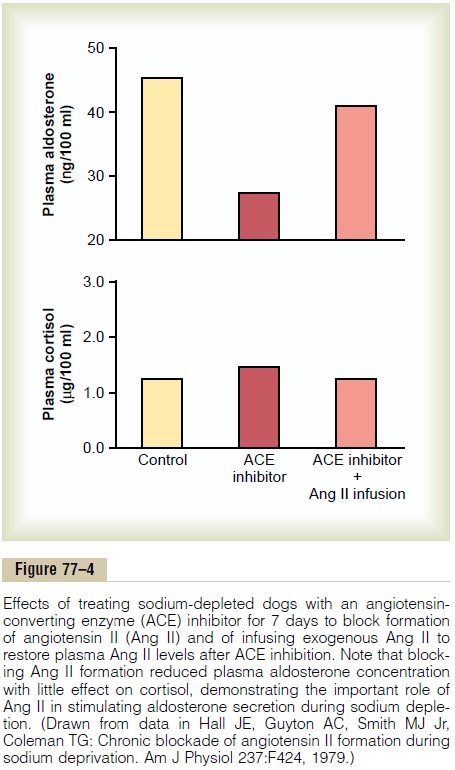Chapter: Medical Physiology: Adrenocortical Hormones
Regulation of Aldosterone Secretion
Regulation of Aldosterone Secretion
The regulation of aldosterone secretion is so deeply intertwined with the regulation of extracellular fluid electrolyte concentrations, extracellular fluid volume, blood volume, arterial pressure, and many special aspects of renal function that it is difficult to discuss the regulation of aldosterone secretion independently of all these other factors. However, it is important to list here some of the more important points of aldosterone secretion control.
The regulation of aldosterone secretion by the zona glomerulosa cells is almost entirely independent of the regulation of cortisol and androgens by the zona fas-ciculata and zona reticularis.
Four factors are known to play essential roles in the regulation of aldosterone. In the probable order of their importance, they are as follows:
1. Increased potassium ion concentration in the extracellular fluid greatly increases aldosterone secretion.
2. Increased activity of the renin-angiotensin system (increased levels of angiotensin II) also greatly increases aldosterone secretion.
3. Increased sodium ion concentration in the extracellular fluid very slightly decreases aldosterone secretion.
4. ACTH from the anterior pituitary gland is necessary for aldosterone secretion but has little effect in controlling the rate of secretion.
Of these factors, potassium ion concentration and the renin-angiotensin system are by far the most potent in regulating aldosterone secretion. A small percentage increase in potassium concentration can cause a severalfold increase in aldosterone secretion. Likewise, activation of the renin-angiotensin system, usually in response to diminished blood flow to the kidneys or to sodium loss, can cause a severalfold increase in aldosterone secretion. In turn, the aldos-terone acts on the kidneys (1) to help them excrete the excess potassium ions and (2) to increase the blood volume and arterial pressure, thus returning the renin-angiotensin system toward its normal level of activity.

Figure 77–4 shows the effects on plasma aldosterone concentration caused by blocking the formation of angiotensin II with an angiotensin-converting enzyme inhibitor after several weeks of a low-sodium diet that increases plasma aldosterone concentration several-fold. Note that blocking angiotensin II formation markedly decreases plasma aldosterone concentration without significantly changing cortisol concentration; this indicates the important role of angiotensin II in stimulating aldosterone secretion when sodium intake and extracellular fluid volume are reduced.
By contrast, the effects of sodium ion concentration per se and of ACTH in controlling aldosterone secre-tion are usually minor. Nevertheless, a 10 to 20 per cent decrease in extracellular fluid sodium ion concentra-tion, which occurs on rare occasions, can perhaps double aldosterone secretion. In the case of ACTH, if there is even a small amount of ACTH secreted by the anterior pituitary gland, it is usually enough to permit the adrenal glands to secrete whatever amount of aldosterone is required, but total absence of ACTH can significantly reduce aldosterone secretion.
Related Topics